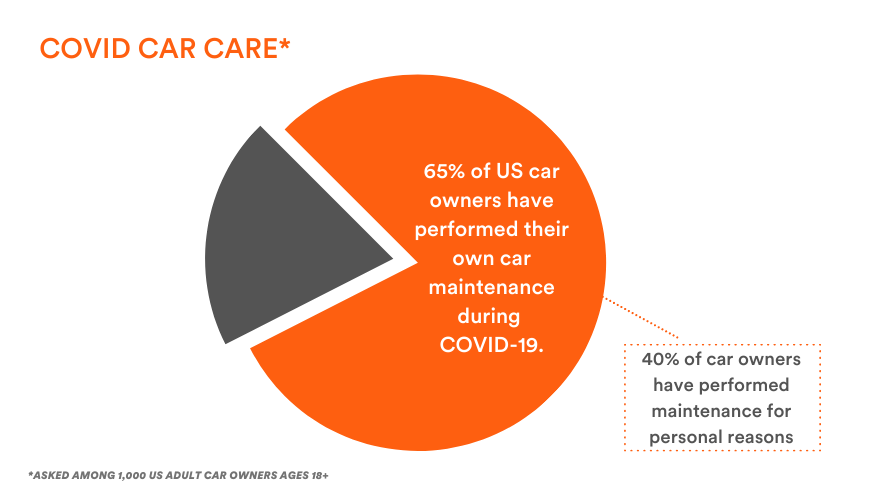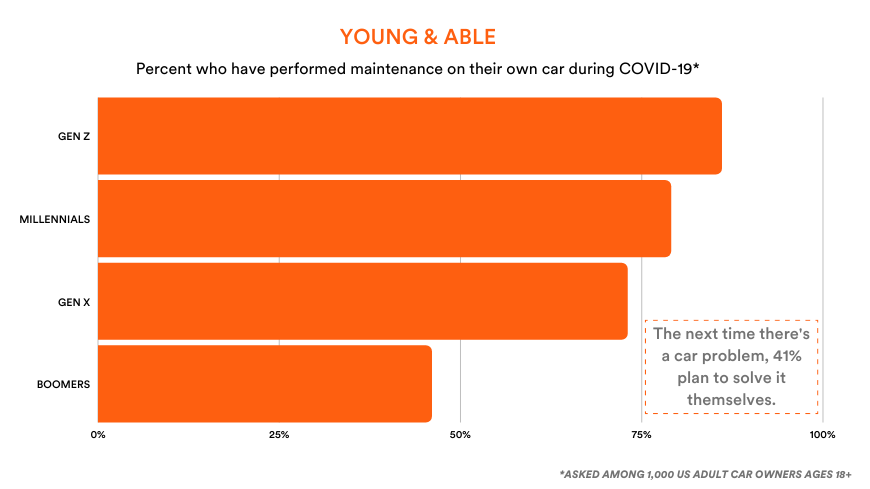Releases
More car owners are steering towards DIY maintenance
plus 7 more findings from our new survey data about how drivers are handling their car care
Free shipping
Best price guarantee
SimpleCrew exclusive savings
0% financing options
Tire replacement coverage
24/7 roadside assistance
Easy returns
Releases
plus 7 more findings from our new survey data about how drivers are handling their car care
We commissioned a survey of 1,000 U.S. adult car owners to see just how things have shifted throughout the pandemic with regard to caring for their vehicles. We found that nearly two-thirds (65%) of respondents have worked on their car during COVID-19. Furthermore, a significant number of car owners think they have what it takes to get the job done. __More than a third (36%) feel completely or very confident in their own car maintenance knowledge and skills. __

But, does the car you drive have an impact on your readiness to tackle your own car maintenance? We found that owners of larger vehicles often subject them to rugged conditions so maintenance know-how is virtually a must. __Those whose primary car is a truck or Jeep (50%) are more likely than those with sedans (35%) or SUVs (32%) to be completely or very confident in their car maintenance knowledge and skills. __
It’s safe to say that we can point to the internet, the domain of younger Americans, as having turbo-boosted the DIY surge. Gen Z (86%*) car owners are most likely to work on their own cars, followed by Millennials (79%), Gen Xers (73%) and Boomers (46%).

D-I-Y automotive maintenance provides a sense of accomplishment along with substantial savings. It can also be remarkably therapeutic, taking your mind off the daily worries that are weighing you down. In fact, car owners who said they worked on their cars at home are getting as much out of their quality time with their vehicles as the effort they’re putting in. __Over 3 in 5 (62%) car owners who have worked on their cars have done so for personal reasons, including to be more self-reliant (25%), as a hobby during the pandemic (15%), or to spend time with their loved ones (14%). __
With lots to learn and plenty of challenges to be met, it’s a whole lot more rewarding than another afternoon burned up playing video games. When you level up with a new set of skills, your horizons widen. Plus, many car owners find satisfaction in accepting the challenge of keeping their cars rolling smoothly. Those who worked on their car for personal reasons (56%) are more likely to try to solve the issue themselves than those in general who would do so (41%).
Americans also have plenty of basic motivation to take a hands-on approach to keeping their cars up and running. __Of those who have worked on their cars, most (80%) have performed maintenance on their own car for practical reasons, such as saving money (48%) or extending the life of their car (43%). __
From warm fuzzy feelings and self-reliance to saving money and maximizing your car’s performance, there are plenty of reasons why this COVID era-trend may have staying power. __Whereas nearly 3 in 5 (59%) car owners are more likely to take their car to the shop the next time they have an issue, more than 2 in 5 (41%) will try to fix it themselves. __
Start with some of our blog posts about how to maintain your car. From our handy dandy Oil Change Guide and our Health Check Up Cheat Sheet that will get you started to our Car-detailing Rundown that will help you finish the job, there's no shortage of resources on the SimpleTire blog for you to explore.
SURVEY METHODOLOGICAL NOTES
The SimpleTire Survey was conducted by Wakefield Research among 1,000 US adult car owners ages 18+, between September 18th and September 24th, 2020, using an email invitation and an online survey. Quotas have been set to ensure reliable and accurate representation of the US adult car owners population, ages 18+. Results of any sample are subject to sampling variation. The magnitude of the variation is measurable and is affected by the number of interviews and the level of the percentages expressing the results. For the interviews conducted in this particular study, the chances are 95 in 100 that a survey result does not vary, plus or minus, by more than 3.1 percentage points from the result that would be obtained if interviews had been conducted with all persons in the universe represented by the sample.